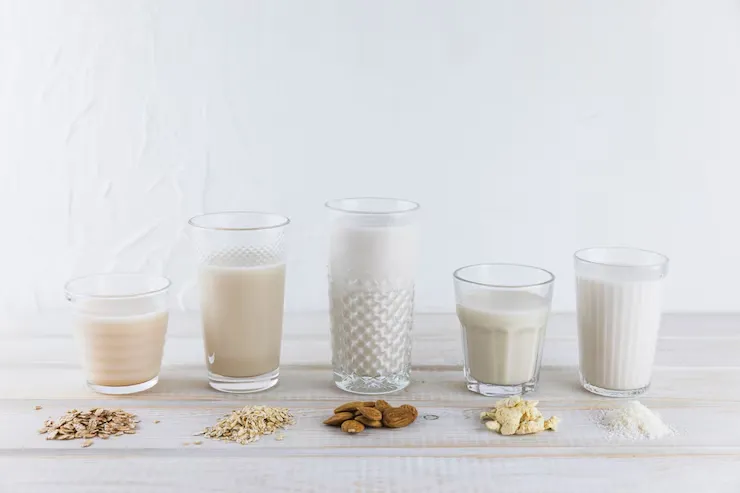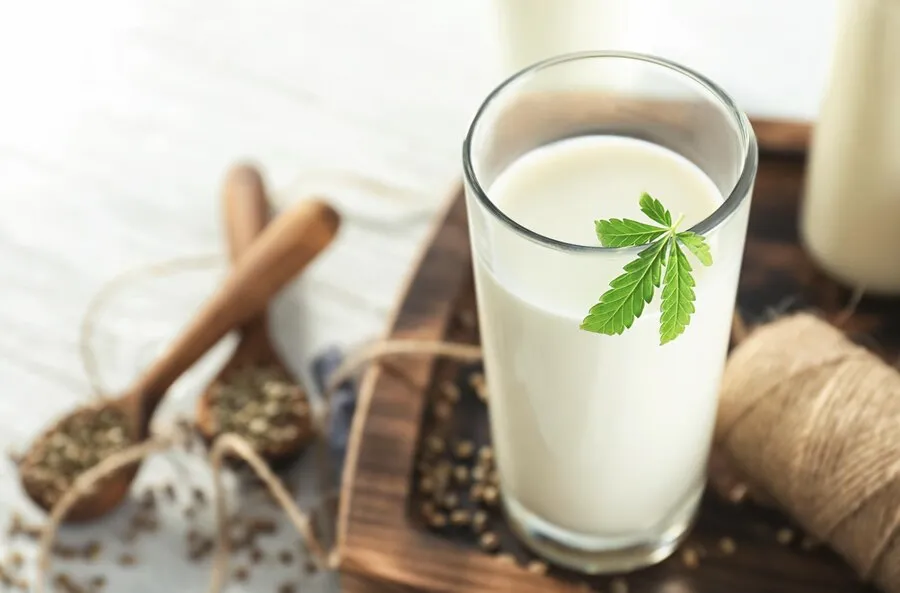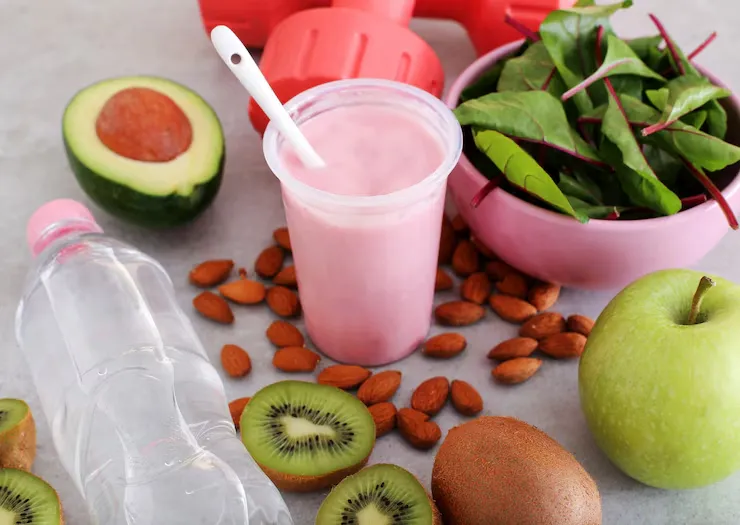7 Best Organic Milk Alternatives for Dairy-Free Living

- The Rise of Organic Milk Alternatives
- 1. Organic Almond Milk
- 2. Organic Soy Milk
- 3. Organic Oat Milk
- 4. Organic Coconut Milk
- 5. Organic Hemp Milk
- 6. Organic Cashew Milk
- 7. Organic Rice Milk
- Choosing the Right Organic Milk Alternative for You
- The Health Benefits of Switching to Organic Milk Alternatives
- Tips for Incorporating Organic Milk Alternatives into Your Diet
- Conclusion
- FAQ
Are you looking to make the switch to a dairy-free lifestyle? Whether it’s for health reasons, environmental concerns, or personal preferences, finding the right organic milk alternative can be a game-changer. In this comprehensive guide, we’ll explore the top seven organic milk alternatives that not only taste great but also provide essential nutrients for your daily needs.
The Rise of Organic Milk Alternatives
Gone are the days when dairy milk was the only option on the shelves. Today, health-conscious consumers are increasingly turning to organic milk alternatives for various reasons. These plant-based options offer a wealth of benefits, from being lactose-free to having a lower environmental impact.
But with so many choices available, how do you know which one is right for you? Let’s dive into the world of organic milk alternatives and discover the perfect match for your taste buds and nutritional needs.

1. Organic Almond Milk
When it comes to organic milk alternatives, almond milk often takes the crown as the most popular choice. Its mild, nutty flavor and creamy texture make it a versatile option for everything from your morning coffee to baking.
Almond milk is naturally low in calories and fat, making it an excellent choice for those watching their weight. It’s also rich in vitamin E, an antioxidant that supports skin health and immune function.
However, it’s worth noting that almond milk is relatively low in protein compared to dairy milk. To boost its nutritional profile, look for brands fortified with calcium and vitamin D.
2. Organic Soy Milk
For those seeking a protein-packed organic milk alternative, soy milk is hard to beat. It offers a complete protein profile, meaning it contains all nine essential amino acids that our bodies can’t produce on their own.
Soy milk also provides a good dose of potassium, which is crucial for heart health and blood pressure regulation. Its creamy texture and mild flavor make it an excellent substitute in cooking and baking.
Some people worry about the phytoestrogens in soy, but research suggests that moderate consumption of soy products is safe and may even offer health benefits, such as reduced risk of certain cancers.
3. Organic Oat Milk
Oat milk has surged in popularity in recent years, and for good reason. This organic milk alternative boasts a creamy texture and slightly sweet flavor that many find reminiscent of dairy milk.
One of the standout features of oat milk is its fiber content. The soluble fiber in oats, known as beta-glucan, has been linked to improved heart health and better blood sugar control.
Oat milk is also naturally free from common allergens like nuts and soy, making it a safe choice for those with multiple food sensitivities. Its creamy consistency makes it perfect for lattes and other frothy drinks.
4. Organic Coconut Milk
If you’re looking for an organic milk alternative with a rich, indulgent flavor, coconut milk might be your new favorite. Its creamy texture and tropical taste can add a delightful twist to smoothies, curries, and desserts.
Coconut milk is high in medium-chain triglycerides (MCTs), a type of fat that may boost metabolism and provide quick energy. It’s also rich in minerals like manganese and copper, which support bone health and immune function.
However, coconut milk is higher in saturated fat than other plant-based alternatives, so it’s best enjoyed in moderation as part of a balanced diet.
5. Organic Hemp Milk
Hemp milk might not be as well-known as some other organic milk alternatives, but it’s certainly worth considering. Made from the seeds of the hemp plant, this milk offers a unique nutritional profile.
Hemp milk is an excellent source of omega-3 and omega-6 fatty acids, which are essential for heart and brain health. It also contains all nine essential amino acids, making it a complete protein source.
The nutty flavor of hemp milk pairs well with cereals and can add depth to savory dishes. While it may not be as widely available as other alternatives, its nutritional benefits make it worth seeking out.

6. Organic Cashew Milk
For those who love a rich and creamy texture, organic cashew milk is a dream come true. Its smooth consistency and mild, slightly sweet flavor make it a versatile choice for both sweet and savory applications.
Cashew milk is lower in calories than many other organic milk alternatives, making it a good option for those watching their calorie intake. It’s also a good source of heart-healthy unsaturated fats.
While cashew milk is not as high in protein as some other alternatives, it does offer a good dose of copper and magnesium, minerals that support bone health and energy production.
7. Organic Rice Milk
For individuals with multiple food allergies, finding a suitable organic milk alternative can be challenging. Enter rice milk, one of the least allergenic plant-based milk options available.
Rice milk has a naturally sweet taste and a thin, light consistency. It’s a good source of B vitamins, which are essential for energy metabolism and nervous system function.
However, rice milk is lower in protein and calcium compared to other alternatives, so look for fortified varieties if you’re relying on it as a significant part of your diet.
Choosing the Right Organic Milk Alternative for You
With so many organic milk alternatives available, how do you choose the right one for your needs? Here are some factors to consider:
- Nutritional profile: Consider your dietary needs. If you’re looking for protein, soy or hemp milk might be your best bet. For calcium, look for fortified options.
- Taste and texture: Each alternative has its unique flavor and consistency. Try different options to find the one that pleases your palate.
- Allergens: If you have food allergies, be sure to choose an alternative that’s safe for you. Rice and oat milk are often good choices for those with multiple allergies.
- Environmental impact: Some alternatives, like almond milk, require more water to produce than others. If sustainability is a priority, research the environmental footprint of different options.
- Additives: Check the ingredient list for added sugars, stabilizers, or other additives you might want to avoid.
- Versatility: Consider how you’ll use the milk alternative. Some work better in cooking, while others are great for drinking straight.
- Availability and cost: Some alternatives might be more readily available or cost-effective in your area than others.
The Health Benefits of Switching to Organic Milk Alternatives
Making the switch to organic milk alternatives can offer numerous health benefits:
- Lactose-free: For those with lactose intolerance, plant-based alternatives eliminate digestive discomfort.
- Lower in saturated fat: Most plant-based milks are lower in saturated fat than whole dairy milk, which can be beneficial for heart health.
- Varied nutrient profiles: Different alternatives offer different nutritional benefits, allowing you to diversify your nutrient intake.
- Potential allergen avoidance: For those with dairy allergies, plant-based alternatives provide safe options.
- Reduced hormones: Organic plant-based milks are free from added hormones sometimes found in conventional dairy.
- Antioxidants: Many plant-based milks are rich in antioxidants, which can support overall health and fight inflammation.
Tips for Incorporating Organic Milk Alternatives into Your Diet
Ready to make the switch? Here are some tips to help you seamlessly incorporate organic milk alternatives into your daily routine:
- Start gradually: If you’re used to dairy milk, try mixing your chosen alternative with dairy milk at first, gradually increasing the ratio of alternative milk.
- Experiment with different brands: Not all organic milk alternatives are created equal. Try different brands to find the one you like best.
- Use in cooking and baking: Most milk alternatives can be used as a 1:1 replacement for dairy milk in recipes. However, be aware that the flavor and consistency might slightly affect the final product.
- Make your own: For the ultimate control over ingredients, try making your own organic milk alternatives at home. It’s easier than you might think!
- Pair wisely: Different alternatives pair better with certain foods. For example, coconut milk is great in curry dishes, while almond milk works well in smoothies.
- Check for fortification: If you’re relying on milk alternatives as a significant source of nutrients, choose fortified options to ensure you’re getting essential vitamins and minerals.
- Store properly: Most organic milk alternatives need to be refrigerated after opening and used within 7-10 days for optimal freshness and safety.
Conclusion
The world of organic milk alternatives is vast and exciting, offering something for every taste preference and dietary need. Whether you’re lactose intolerant, vegan, or simply looking to diversify your diet, these plant-based options provide a wealth of nutritional benefits and culinary possibilities.
Remember, there’s no one-size-fits-all solution when it comes to organic milk alternatives. Don’t be afraid to experiment with different types to find the one that best suits your lifestyle and taste buds. With the variety available today, you’re sure to find an alternative that not only meets your nutritional needs but also delights your palate.
By choosing organic milk alternatives, you’re not only making a choice that can benefit your health but also one that can have a positive impact on the environment. So go ahead, pour yourself a glass of your favorite plant-based milk, and toast to a healthier, more sustainable future!
FAQ
- Are organic milk alternatives nutritionally equivalent to dairy milk?
While organic milk alternatives offer various nutritional benefits, their profiles differ from dairy milk. Some are fortified to match dairy milk’s calcium and vitamin D content, but protein levels can vary. It’s important to choose alternatives that meet your specific nutritional needs. - Can I use organic milk alternatives in cooking and baking?
Yes, most organic milk alternatives can be used as a 1:1 replacement for dairy milk in cooking and baking. However, be aware that the flavor and consistency might slightly affect the final product. Some alternatives work better in certain recipes than others. - Are organic milk alternatives suitable for children?
Many organic milk alternatives can be suitable for children, but it’s essential to choose ones that are fortified with nutrients crucial for growth, such as calcium and vitamin D. Always consult with a pediatrician before making significant changes to a child’s diet. - How long do organic milk alternatives last?
Unopened shelf-stable organic milk alternatives can last for several months. Once opened, they typically need to be refrigerated and consumed within 7-10 days. Always check the packaging for specific storage instructions and expiration dates. - Are organic milk alternatives more environmentally friendly than dairy milk?
Generally, organic milk alternatives have a lower environmental impact than dairy milk in terms of water usage and greenhouse gas emissions. However, the specific environmental impact can vary depending on the type of alternative and how it’s produced.




